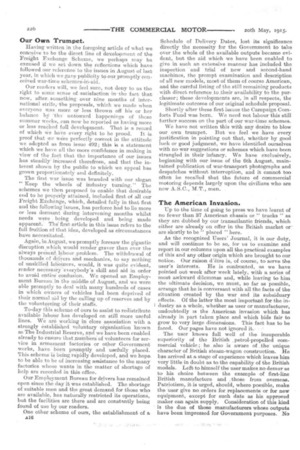Our Own Trumpet.
Page 2

If you've noticed an error in this article please click here to report it so we can fix it.
Having written in the foregoing article of what we conceive to be the direct line of development of the Freight Exchange Scheme, we perhaps may be excused if we set down the reflections which have followed our reference" to the issues in August of last year, in which we gave publicity to our promptly conceived war-time schemes-in-aid.
Our readers will, we feel sure, not deny to us the right to some sense of satisfaction inthe fact that now, after. something over nine months of international strife-the proposals, which we made when everyone was more or less thrown off his or her balance by 'the untOward happenings of those summer weeks, van now be reported as having more or less reached full development.. That is a record of which We have every right to be proud'. It is. proof that we Were perfectly correct in the attitude' we adopted as from issue 492; this is a, statement which we have all the'rnore confidence in making in view of the .fact that the importance of our issues has steadily increased therefrom, and that the interest shown by the public to which we appeal has grown proportionately and definitely.
The first war issue was branded with our slogan " Keep the wheels of industry turning." The schemes we then proposed to enable that desirable eed to be properly attained, included first a all our Freight E-Xchange, which, detailed fully in that first and the followingissues, has perforce had to lie more or less dormant during intervening months whilst needs were . being developed and being made apparent. The` first article in this issue refers to the full fruition of that idea., developed as circumstances have necessitated.
Again, in August, we promptly foresaw the gigantic disruption which would render graver than ever the always present labour problem. The withdrawal of thousands, of drivers and mechanics, to say nothing of unskilledlabourers, would, it was quite evident, render necessary 'everybody's skill and aid in order to avoid entire' confusion. We opened an Employment Bureau in the middle of August, and we were able promptly todeal with many hundreds of cases in which owners of vehicles had been deprived of their normal aid by the calling up of reserves and by the volunteering of their staff's.
To-day this scheme of ours to assist to redistribute available labOur has developed on still more useful lines. We arevi-'orking in close association with a strongly established voluntary or'ganiSation known as The Industrial Reserve, and we have been enabled already to ensure that numbers of volunteers for service in armament factories or other Government works, have been promptly and usefully placed. This scheme is being rapidly developed, and we hope. to be able to be of increasing assistance to the many factories whose wants in the matter of shortage of help are recorded in this office.
Our Employment Bureau for drivers has remained open since the day it was established. The shortage of suitable men and the great demand. for those who are available, has naturally restricted its operations, but the facilities are there and are constantly being found of use by our readers.
One other scheme of ours, the establishment of a Schedule of Delivery Dates, lost its significance directly the necessity for the Government to take over the whole of the available outputs became evident, but the aid which we have been enabled to give in such an extensive manner has included the inspection and trial of new and seCond-hand machines, the prompt examination and description ofall new models, most of theta of course American, and the careful listing of the still remaining products with direct refereneetostheir availability to the purchaser; these developments are, in all respects, the legitimate outcome of our original schedule proposal.
Shortly after these first issues the Campaign Comforts Fund was born. We need not labour this still further success on the part of our war-time schemes.
We have not written this with any desire to blow our own trumpet. But we feel we have every justification in pointing out that, whether by good luck or good judgment, we have identified ourselves with no war suggestions or schemes which have been strangled in their infancy. We have exclusively, beginning with our issue of the 6th August, maintained publication of war-transport photographs and despatches without interruption, and it cannot too often be recalled that the future of commercial motoring depends largely upon the civilians who are now A.S.C., MT, men.






















